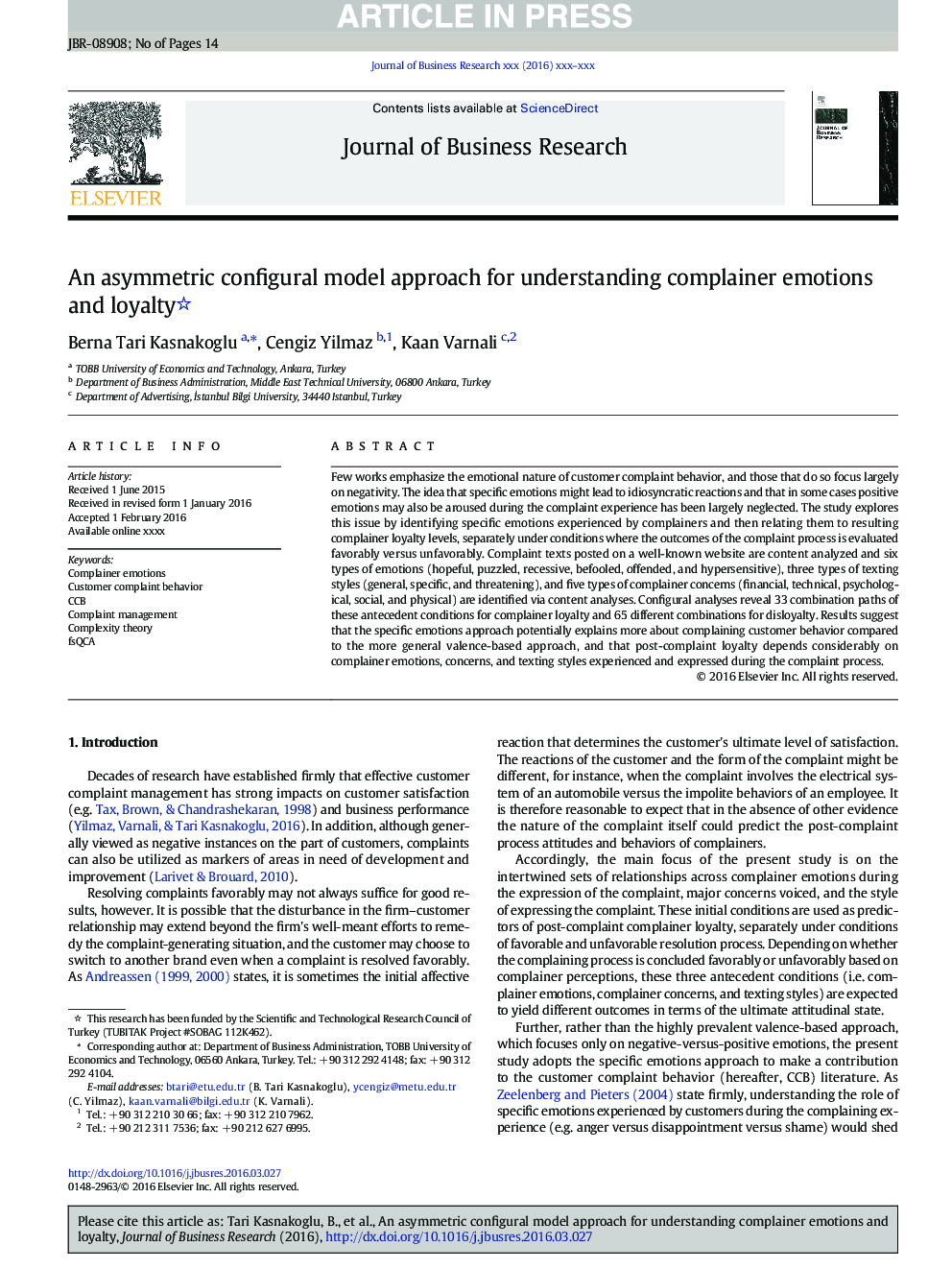| کد مقاله | کد نشریه | سال انتشار | مقاله انگلیسی | نسخه تمام متن |
|---|---|---|---|---|
| 10492537 | 940273 | 2016 | 14 صفحه PDF | دانلود رایگان |
عنوان انگلیسی مقاله ISI
An asymmetric configural model approach for understanding complainer emotions and loyalty
ترجمه فارسی عنوان
یک رویکرد مدل پنهان نامتقارن برای فهمیدن احساسات و وفاداری شکایت کننده
دانلود مقاله + سفارش ترجمه
دانلود مقاله ISI انگلیسی
رایگان برای ایرانیان
ترجمه چکیده
تعداد کمی از کارها بر ماهیت عاطفی رفتار رفتار شکایت تأکید دارند و کسانی که این کار را عمدتا بر منفی بودن تمرکز می کنند. این ایده که احساسات خاص ممکن است منجر به واکنش های فردی شود و در بعضی موارد احساسات مثبت نیز ممکن است در طول تجربه شکایت موجب نادیده گرفتن شود. این مطالعه با شناسایی احساسات خاصی که توسط شکایت کنندگان تجربه می شود و سپس آنها را به سطوح وفاداری شکایت کننده تقسیم می کند، به طور جداگانه در شرایطی که نتایج فرایند شکایت به طور مطلوب در مقابل نامطلوب ارزیابی می شود، بررسی می شود. متون شکایتی که در وبسایت شناخته شده ارسال شده اند محتوا تحلیل شده و شش نوع احساسات (امیدوار، غم انگیز، غم انگیز، غم انگیز، عصبانی و حساس)، سه نوع سبک پیامک (عمومی، خاص و تهدید کننده) و پنج نوع نگرانی های شکایت کننده (مالی، فنی، روانی، اجتماعی و فیزیکی) از طریق تجزیه و تحلیل محتوا شناسایی می شوند. تجزیه و تحلیل های ثابت نشان می دهد 33 مسیر ترکیبی از این شرایط پیشین برای وفاداری شکایت کننده و 65 ترکیب مختلف برای نومیدی. نتایج نشان می دهد که رویکرد احساسات خاص به طور بالقوه بیشتر در مورد رفتار شکایت مشتری در مقایسه با رویکرد مبتنی بر اعتماد عمومی بیشتر توضیح می دهد و اینکه وفاداری پس از شکایت به میزان قابل توجهی بر احساسات، نگرانی ها و سبک های ارسال پیامک شکاری متبحر شده و در جریان شکایت بیان می شود.
موضوعات مرتبط
علوم انسانی و اجتماعی
مدیریت، کسب و کار و حسابداری
کسب و کار و مدیریت بین المللی
چکیده انگلیسی
Few works emphasize the emotional nature of customer complaint behavior, and those that do so focus largely on negativity. The idea that specific emotions might lead to idiosyncratic reactions and that in some cases positive emotions may also be aroused during the complaint experience has been largely neglected. The study explores this issue by identifying specific emotions experienced by complainers and then relating them to resulting complainer loyalty levels, separately under conditions where the outcomes of the complaint process is evaluated favorably versus unfavorably. Complaint texts posted on a well-known website are content analyzed and six types of emotions (hopeful, puzzled, recessive, befooled, offended, and hypersensitive), three types of texting styles (general, specific, and threatening), and five types of complainer concerns (financial, technical, psychological, social, and physical) are identified via content analyses. Configural analyses reveal 33 combination paths of these antecedent conditions for complainer loyalty and 65 different combinations for disloyalty. Results suggest that the specific emotions approach potentially explains more about complaining customer behavior compared to the more general valence-based approach, and that post-complaint loyalty depends considerably on complainer emotions, concerns, and texting styles experienced and expressed during the complaint process.
ناشر
Database: Elsevier - ScienceDirect (ساینس دایرکت)
Journal: Journal of Business Research - Volume 69, Issue 9, September 2016, Pages 3659-3672
Journal: Journal of Business Research - Volume 69, Issue 9, September 2016, Pages 3659-3672
نویسندگان
Berna Tari Kasnakoglu, Cengiz Yilmaz, Kaan Varnali,
